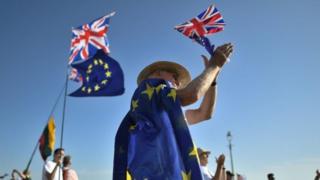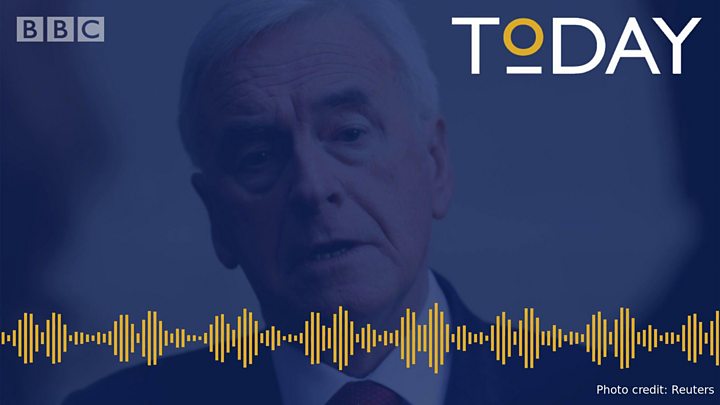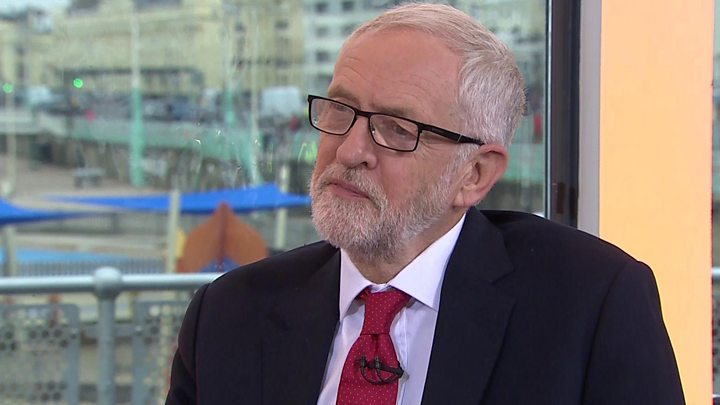Labour: Jeremy Corbyn faces battle with members over Brexit policy
 Image copyright
PA Media
Image copyright
PA Media
Jeremy Corbyn faces a battle over Labour's Brexit policy later as members choose between two competing strategies at the party's annual conference.
They will decide whether Labour should explicitly back Remain in any future referendum, or adopt Mr Corbyn's stance of staying neutral until a later date.
Unison has broken ranks with other unions to back the Remain motion.
The BBC's Laura Kuenssberg said this could "shift the balance" and increase the chance of Mr Corbyn being defeated.
With unions controlling half of the votes at the conference, their position is vital.
The majority of Labour's 12 affiliated unions are expected to back the leadership after agreeing a joint position with Mr Corbyn two weeks ago.
But our political editor said Unison's move - now also followed by the Musicians Union - was very significant, and makes it more likely that conference decides to back a Remain stance.
Labour's position on Brexit has dominated the conference agenda, with huge disagreements over the issue.
The party's draft plan for its Brexit policy, put forward by Mr Corbyn, suggests that, if Labour wins power in a general election, it would remain neutral while negotiating a new deal with the EU within three months.
It would then hold a referendum within six months, and the party would decide which side to back ahead of that at a special conference.
But grassroots activists at the conference have campaigned for an unambiguous Remain stance.

Late on Sunday, attempts to find a consensus during a behind-closed-doors "compositing" meeting failed to agree on words for a single Brexit motion.
As a result, members will debate, then vote, on three separate motions on Monday, including one calling on Labour to campaign "energetically" for Remain.
'High emotions'
The leader of the Unite union, Len McCluskey, said Labour must avoid dividing on Brexit lines and follow the Tories and Lib Dems in "writing off half of the nation".
By keeping both Remain and Leave voters onside, he said Jeremy Corbyn would be able "to walk through the door of Downing Street" in the coming months,
"Jeremy Corbyn is a thousand times right in trying to speak up for the whole of the country at this time of crisis," he said. "Please give Jeremy Corbyn the support he needs."
Speaking earlier on BBC Radio 4's Today programme, John McDonnell said he would support Remain in any future vote as he thought it was the "best option", but he believed other members should be allowed to "exercise their own judgement".
The shadow chancellor added: "People have high emotions on this because they feel it is important, but people are respecting each others views as well.
"Do not mistake democracy for division. It isn't. What we are seeing is an honest debate."
Other senior figures in Labour like shadow Brexit secretary Sir Keir Starmer and shadow foreign secretary Emily Thornberry - due to address delegates on Monday - also support a full-throated Remain stance.
Hilary Benn, Labour MP and chair of the Commons Brexit committee, told BBC Radio 4's Today programme Labour's position of a second referendum was "sensible" and the "the only way out of the deadlock we are facing".
But he said it was clear the bulk of the party - and the shadow cabinet - had already confirmed they would back Remain.
So why do the unions matter?
Quite simply because the unions control half of the votes on the conference floor.
United, they really cannot be defeated.
And Jeremy Corbyn thought he had them in the bag when a Brexit position - to stay officially neutral during a snap election - was agreed behind closed doors here in Brighton a couple of weeks ago.
But now one union has broken ranks.
And size matters.
Unison is one of the big three…alongside the GMB and Unite.
So Unison's backing of the Remain motion that means there is more chance of it passing.
But to do so, the vast majority of grassroots constituency delegates would have to back it too. Most do support a Remain position at the election.
So the leadership are currently trying to convince some of them that they should put loyalty to Jeremy Corbyn ahead of their views on Brexit.
Even if the Remain motion passes, it won't automatically be the position adopted in the manifesto.
The final decision is taken at what's called a Clause 5 meeting on which Jeremy Corbyn's allies and loyal unions are well represented.
But even the policy is preserved, the optics of big unions (apart from Unison) outvoting the grassroots wouldn't be ideal - as Jeremy Corbyn initially came to power as a champion of ordinary members.
Andrew Lewin, of Remain Labour, said the prospect of alternatives being put to a vote was "a huge step forward".
"Labour members will have the chance to change party policy - so Labour commits to campaign to Remain in all circumstances," he said.
Michael Chessum, of left-leaning group Another Europe, said despite "underhand manoeuvring" by some in the party, Jeremy Corbyn would, "as a democrat", have to accept a pro-Remain stance if conference backed it.
"If we allow another fudge to happen, we make Labour less electable," he told BBC News.

Speaking to the BBC's Andrew Marr show on Sunday, Mr Corbyn would not be drawn on which side he would back, saying "let's see" what kind of new deal he was able to negotiate with the EU.
He said the party must respect the result of the Brexit referendum and do more to understand why people voted to leave.
Away from Brexit, Labour has announced a pledge to introduce free personal care in England for over-65s most in need of it, so they will not have to pay for help with dressing, washing and meals.
At the moment, only those with assets of below £23,250 get help from state.
It is the latest of several new policies announced at the conference, including pledges to:
On Sunday, party members also voted in favour of integrating private schools into the state sector.
Independent schools would have their charitable status withdrawn, as well as other public subsidies and tax privileges, and universities would have to admit the same proportion of private school students as in the wider population, currently 7%.
The vote means members have signalled a desire for the policy to be included in Labour's next general election manifesto.